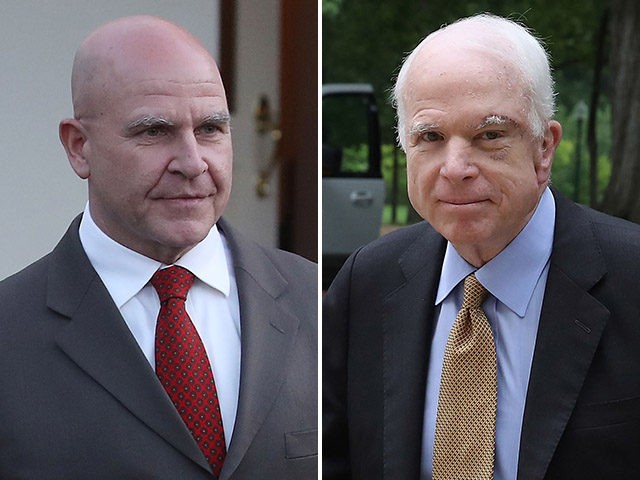Sen. John McCain (R-AZ) announced Thursday that he will submit a plan for more U.S. troops in Afghanistan when Congress drafts its annual defense policy bill.
McCain’s statement, described by the Associated Press as “a rebuke to President Donald Trump,” comes after the Commander-in-Chief rejected Afghan war plans from the Pentagon and National Security Adviser H.R. McMaster. Those strategies, though not revealed to the public, have been described with proposals similar to McCain’s.
Politico‘s Susan B. Glasser reported in late July that Laurel Miller, former Special Representative for Afghanistan and Pakistan (SRAP), took part in McMaster’s Afghanistan planning and “believes that is has produced essentially a status-quo, stay-the-course proposal.”
The primary suggestions in the rejected strategy include increased troop deployment and at least four more years of engagement:
[T]he president’s hesitation is also, according to multiple current and former senior U.S. officials I’ve spoken with in recent days, a striking vote of no-confidence in his national security adviser, H.R. McMaster, who has been trying and failing for months to sell the president on a new plan for Afghanistan.
McMaster has made a major policy review of America’s long, failed war there his personal mission, according to the sources, and he pushed hard to get a new strategy that would include the relatively modest troop increases and a commitment to at least another four-year timeline approved in advance of Trump’s May summit with NATO allies.
…
Hawks like Republican Sen. John McCain of Arizona, until his recent health troubles, had been urging the administration to commit to seeking an outright victory in Afghanistan, but Miller says it’s simply not doable.
“I don’t think there is any serious analyst of the situation in Afghanistan who believes that the war is winnable. It’s possible to prevent the defeat of the Afghan government and prevent military victory by the Taliban, but this is not a war that’s going to be won, certainly not in any time horizon that’s relevant to political decision-making in Washington,” Miller says.
Miller watched and participated in McMaster’s Afghan policy review up close for months and she believes that it has produced essentially a status-quo, stay-the-course proposal for a president unlikely to favor it. As Trump’s remarks the other day made clear, “he has not been persuaded,” Miller says.
Now, AP’s Richard Lardner writes, an “increasingly impatient” McCain wants more troops deployed and “long-term, open-ended” engagement:
“Nearly seven months into President Trump’s administration, we’ve had no strategy at all as conditions on the ground have steadily worsened,” said McCain, a leading voice in Congress on national security matters. “But we must face facts: We are losing in Afghanistan and time is of the essence if we intend to turn the tide.”
McCain, R-Ariz., said he’ll seek a vote on his “strategy for success” in Afghanistan when the Senate returns in September and takes up the annual defense policy bill.
His plan calls for sending in more U.S. combat forces, although he doesn’t say how many. But McCain wants them to be less constrained in carrying out missions against the Taliban, al-Qaida, a growing Islamic State affiliate and other extremists.
The plan, McCain said, is to “deny, disrupt, degrade, and destroy the ability of terrorist groups to conduct attacks against the United States, its allies, or its core interests.”
…
The amendment he plans to propose adding to the defense policy bill calls for a “long-term, open-ended” U.S.-Afghanistan partnership that includes an “enduring U.S. counterterrorism presence.”
He also recommends expanding U.S. training assistance to the Afghan security forces so they can capably fight the Taliban and other militant groups. McCain proposes longer-term support that will allow the Afghans to develop and expand their own intelligence, logistics, special forces and airlift operations.
Read the rest of the story here.

COMMENTS
Please let us know if you're having issues with commenting.